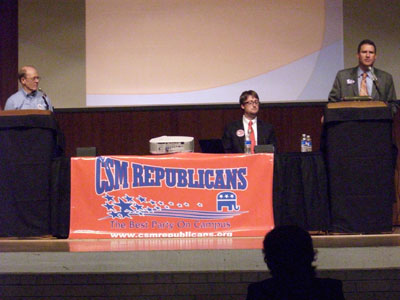The air is beginning to become cool and crisp, and the aspens are turning yellow. As far as the eye can see, people are arguing passionately over the economy, immigration, health care, and a plethora of other issues. In preparation for the November elections, the CSM Republicans Club hosted a “General Election Candidate’s Forum” October 1. Candidates and their representatives in the gubernatorial, senatorial, and congressional races shared their positions in speeches and in answer to questions.
The evening began with short speeches by a variety of Republican candidates including Steven Bailey, candidate for Jefferson County Commissioner; Dan Rosier, candidate for Jefferson County Treasurer; and Tim Kauffman, candidate for the US House of Representatives in district 2.
Steven Bailey, clearly iterated a common concept by declaring, “I’m not a politician, I’m not a lawyer, but I looked around and I saw that our country was in trouble, deep trouble, so I was motivated to run.” His address, along with Jefferson County Treasurer candidate Dan rosier and US House candidate Tim Kauffman were merely a warm-up for the primary focus of the evening – the debates.
Before beginning the debates, Braden Johnson, chairman of the CSM Republicans Club, explained the procedures and purposes of the debate. “We have organized this event in a non-partisan way so the students here at Mines can become familiar with the candidates… as well with the issues on the ballot. We believe that no matter what your party affiliation or level of involvement has been, it is important that all people in this nation exercise their civic right to vote,” Johnson said.
Each candidate was allowed five minutes for opening remarks. Then they were asked questions about issues relevant to each respective audience. Finally, each candidate received a two minute conclusion.
The first segment was the gubernatorial debate. First, Ted Harvey spoke as a surrogate for Tom Tancredo and the American Constitution Party. He gave an upbeat address, speaking with certainty that his candidate would be elected. He answered questions on the state budget woes, the economy, immigration, health care, energy, and the school system. Consistently, he transmitted the message that the free market economy and reduced government involvement can solve the economic issues facing Colorado. Harvey urged Republicans unsure of which candidate to select to choose Tancredo, saying, “We have to decide – are we going to win this governor’s office or not? That’s all I’m asking you to look at… who has the best chance of beating Hickenlooper? As Republicans, that’s all we should care about. Who has the best chance to move our conservative values forward?”

Dan Maes then addressed the audience. He transmitted a large amount of information in his introduction, as he rebutted Harvey’s logic in choosing Tancredo and outlined his plan for the state. Maes then answered the same questions as Harvey in much the same way, again emphasizing the importance of limited government and the free market economy. Likely the most important segment of Maes’ address came near the beginning, when he announced his plans, “Number one, we must downsize state government…it has to be done and we need someone with actual business experience, that’s done it before. Number two, we get our energy industry back strong in our state. Number three, we do what Republicans are supposed to do – that’s cut taxes.”
After the gubernatorial debate, the focus shifted towards national politics with the senatorial and congressional candidates. In the Senate race, John Zakhem, speaking as a surrogate for Republican Ken Buck, stated, “I’m here today to submit to you that selecting the right candidate for US Senate is one of the most important things you are going do all year.” He answered the questions posed to him about Buck’s views on the economy, health care, immigration, free trade, foreign policy, and energy in line with Harvey and Maes, emphasizing the importance of the free market, reduced taxes, and reduced regulation. Surrogate Bob Owens, representing Democrat Michael Bennet, seemed to face the difficulty of not knowing how his candidate felt about several of the questions, but did his best to answer. His replies sharply contrasted with Zackhem’s answers. He strongly opposed the Republican positions of the free market economy, yet was unsure of Bennet’s stance. “But I do know his position would not be that government should get out of the way. Getting out of the way is what happened for eight years in the Bush administration and part of the Clinton administration, and as we saw in 2008, that was a disastrous thing to have happen. We can’t get the economy back on track just by cutting taxes and decreasing government regulation, which is already pretty weak in many areas…we need to keep stimulating the economy.”
In the congressional debate, Democrat John Flerlage spoke for himself and Debbie Brown represented Republican Mike Coffman. Both spoke extensively about their desire to reduce federal government debt and to leave a better world for their children. Flerlage “saw those opportunities [for a future] going away from those children [on his youth hockey team]… we’re not leaving a more peaceful world, a more just world, and a more liveable world.” He answered many of the questions similarly to Owen. Most notably, he favored the strictest environmental policy of any candidate present.
Brown summed up Coffman’s campaign by saying, “Both parties have had their fingerprints on a lot of the problems we face today…and if Republicans gain power again in the House this election, he will only stand with them if they stand for limited constitutional government and conservative principles.” Brown’s answers for Coffman were extremely similar to other Republicans in the debate.
The elections will be here soon, and debates like this can help voters evaluate the various candidates. For now, though, enjoy the fall weather and ponder politics.



'CSM Republicans host bipartisan debate' has no comments
Be the first to comment this post!